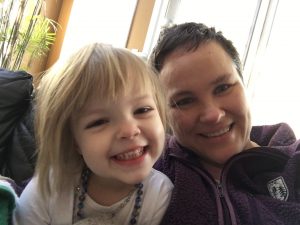Communicating with Parents
 I’m having a really hard time with the fact that I will not be in the same place as my daughter when she is in preschool, even though I know that parents before me have done this. I won’t have a shared experience. I will not be privy to that part of her life.
I’m having a really hard time with the fact that I will not be in the same place as my daughter when she is in preschool, even though I know that parents before me have done this. I won’t have a shared experience. I will not be privy to that part of her life.
As we’ve been looking at different schools, one of the metrics I find myself using to measure whether I like a school or not is how the teacher and school communicate with parents. So when I asked one teacher, “How do you communicate with parents?” and she answered, “Well, there’s conferences,” I was a little freaked out. Just to be clear, if you are waiting until conferences to talk to parents about their child, you are waiting too long.
As a middle school Language Arts teacher, I have re-prioritized my list of things I must do as a teacher, and elevated parent communication as one of my top three things. (The other two are: build personal relationships with students, and model reading and writing for my students.) Communication is a fundamental part of a teacher’s livelihood. I understand this better as my child is making her way into school.
As a parent, I will want to know what my child did in school, if anyone was mean to her or vice-versa, and what she did that was admirable or that needs work. In the beginning, I will want to see glimpses of what happens in the classroom–so that I can “be there” and know the routines, and have the language of the class, so that I can draw more out of my daughter in our conversations about school.
A Question of Frequency
Each fall, I go into the school year with lofty plans to call or email every student’s parent or guardian within the first month of school, with a positive, thoughtful comment that would demonstrate how I got to know their child–and which would also give me some leeway if I needed to contact them later in the year for an issue or concern. The years I met my goal, I needed some planning and dedication. One thing that worked was writing the names of four to eight students a day in my planner so that I would have them in my mind for each hour. That way, I could try to write or say something specific about the student’s participation in my class that day.
How often should a teacher communicate with parents and what do parents want to hear about? As students get older, do parents want to know different things? How much is too much? Which forms of communication (texts, phone calls, emails) work best for parents? How can I best manage showing glimpses of my classroom while respecting any anonymity requested by parents or students?
These are all questions that I’m pondering as I think about communication in my classroom. In the past, I haven’t really had a definite plan, just a few things that I did that fall under communication:
- Weekly email to parents, describing key topics covered in class and any big projects or papers
- Daily emails with homework to specific parents that requested this
- Daily or weekly updates to Moodle with homework and “today in class”
- A blog with student work and classroom photos (some years)
- A blog with links and resources for students and parents to use (other years)
Technology should help make communicating with parents easier. There are tons of platforms, like Moodle or Weebly, that offer a way for you to easily communicate with parents/guardians. Mainly, I want to use something that is easy for me to update and easy for parents to access.

Welcome board at Pierce Elementary School with a calendar for parents and guardians to sign up to volunteer in the preschool classroom.
One area that I haven’t tapped into, but that I really liked in my visits to preschools, was how teachers invite or welcome parents and guardians into their classrooms. I know that this might look different in varying grade levels, but I really liked the schools that offered some way for me to be able to come into the classroom if I wanted to. Just by having this option available, it gave me a sense that this teacher was confident and capable.
Not only would I like to invite parents into my classroom to help out with preparing materials or bulletin boards, but I would like to have them come in for classroom celebrations of writing. Another thing to consider is how to engage parents and guardians of low-income students or English Language Learners.
I’d like to be more deliberate in my plan for communication, so here’s my list of what a comprehensive communication plan for parents and guardians should include:
- A survey or initial email that invites parents and guardians to share their concerns or hopes for their child in the coming school year
- An invitation for parents and guardians to come visit your classroom in some way
- A way for parents and guardians to know what is happening in your classroom
- A place where students can share their work for a wider audience, including parents and guardians
- Resources for parents and guardians who are looking for ways to support their students in your subject or grade
- A calendar of important due dates and classroom events
- Ideas for connecting with parents and guardians throughout the year
Parents want teachers who are accessible and transparent, so what is your plan for communicating with parents on a regular basis? Post your ideas in the comments below or on social media.
 Caroline Thompson (@TeacherThompson) taught middle school ELA for twelve years in Lake Orion before becoming a stay-at-home mom. She supports AARI teachers for Oakland Schools as an independent literacy consultant in the areas of digital media, professional development, and non-fiction resources. Caroline is a Reading and Writing Workshop advocate, a 2008 Oakland Writing Project Teacher Consultant, and a 2009 Oakland County Outstanding Teacher of the Year Nominee. She has a BA in English from Michigan State University and a Masters in the Art of Teaching Reading from Oakland University. She lives in Berkley, Michigan with her husband and their three year old daughter.
Caroline Thompson (@TeacherThompson) taught middle school ELA for twelve years in Lake Orion before becoming a stay-at-home mom. She supports AARI teachers for Oakland Schools as an independent literacy consultant in the areas of digital media, professional development, and non-fiction resources. Caroline is a Reading and Writing Workshop advocate, a 2008 Oakland Writing Project Teacher Consultant, and a 2009 Oakland County Outstanding Teacher of the Year Nominee. She has a BA in English from Michigan State University and a Masters in the Art of Teaching Reading from Oakland University. She lives in Berkley, Michigan with her husband and their three year old daughter.
